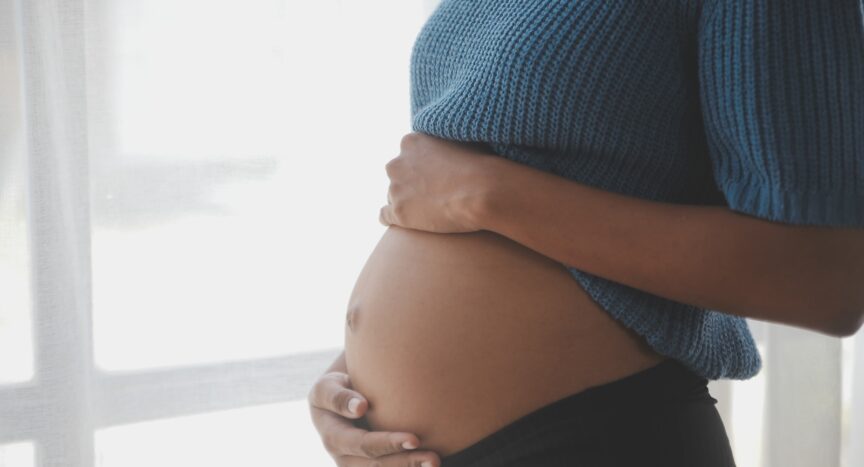The looming implications of Donald Trump’s second presidency pose a direct threat to the reproductive health of women everywhere, but for Black women, the stakes are even higher.
Compared to white women, Black women are three times more likely to die during childbirth. Black women also carry higher rates of preterm births, and infants born to Black women have higher mortality rates than white babies. The culmination of these statistics and Trump’s reelection has forced many Black women to start making difficult decisions regarding their own reproductive health.
“I fear having a child and during labor, my partner has to try to save me, and possibly can’t,” Kayla Spruel, a graduate student at the University of Delaware, told EBONY about her fears for the future of maternal health under another Trump administration.
As Trump’s reelection settles in as a damning reality and not just a lucid nightmare many of us were hoping to wake up from, Black women are channeling their fears, frustrations, and disillusionment with the administration into actionable plans to safeguard their reproductive health—even if that means never having kids at all.
The Writings on the Wall
The super-conservative 900-page policy “Project 25” and its proposed tenants of this dystopian policy wish list gives a harrowing glimpse into how quickly the Trump presidency can erode reproductive justice in the United States.
“[Project 25] gave us a window into what looks like a draconian future, where our rights are completely decimated, and our ability to navigate reproductive health in this country will dramatically shift in ways that we don’t even recognize,” Latham Thomas, founder of global maternal health and education platform Mama Glow Foundation, told EBONY.
These fears have already become a reality for many women in states like Texas, Alabama, Louisiana and Mississippi, where abortions are already banned. From 2019 to 2022, the maternal mortality rate jumped by 56% in Texas. Within the same time, rates for Black women’s maternal mortality rate jumped from 31.6 to 43.6 per 100,000 live births.
Black women are also underrepresented in obstetrics and gynecology. Of the 37,000 OGBYNs in the United States, less than 2% are Black women, which makes it even harder for Black women to advocate for themselves in case of an emergency.
Now, with a Republican majority in the Senate and the Supreme Court, the reproductive future of Black women is in a more parlous state than ever, and many are left to grapple with the fragmented realities of their idyllic futures—stunted by a radical regime and the decimation of democracy in the United States.
Opting Out of Motherhood Under the New Administration
“I told my mom the same night after we found out the election results I would feel guilty bringing a child into this,” said Spruel. Post-election, Spruel went to TikTok to share her disillusionment with procreation under another Trump administration.
“There was this hard realization of ‘Wow, our lives really might change.’ I’m young, I’m in my 20s and I’m still dating. Dating is hard, life is hard, and now being in a world where you’re losing your rights and feel like you’re powerless—it’s scary,” she said.
And this feeling of bodily disenfranchisement has others ready to opt out of motherhood altogether.
“As Black women, we already have such a high rate of passing away during birth or having complications, and we’re not being heard, because people automatically assume we’re supposed to be “strong” because we’re Black,” said Jamila Wheeler, a 25-year-old administrative assistant from Cleveland, Ohio.
Now, Black women who have spent years fantasizing about their futures as wives and mothers are distancing themselves from partnership and marriage altogether. “The possibility of us not having abortion rights is going to push Black women even further into the 4B movement (a feminist movement originated in South Korea that preaches against dating, marrying or procreating with men) as a way to kind of protect ourselves,” said Spruel.
Immediately after the election results, videos began being shared about the best long-term birth control methods and how to safely track your periods without the risk of your data being used against you.
“It’s just smarter for us to act now and start discussing these types of things, like celibacy,” Spruel shared.
A forthcoming Trump presidency has also inspired many Black women to reflect on the role external programming has played in their desire for child-rearing.
“From the time I was little, it was girls play with babies, boys play with trucks. And I feel like we’re kind of conditioned into thinking, ‘Oh, you’re going to be a mom one day,’” Spruel said. But after being forced to reflect on where she sees her life going, she admits that what she has most admired from watching the mothers around her is their strength. “I think for me, and a lot of women wanting to be a mom was more of wanting to be a powerful woman.”
Now, many Black women are exploring what it means to build meaningful connections with children without the active pursuit of motherhood looming over their heads. “I was a previous preschool teacher, I babysit as well, so I have that sense of like motherhood, in a way, even though I’m not related to these children, and I feel like that’s given me a lot of fulfillment,” said Spruel. By taking stock of the existing relationships she has with the children in her life, she was able to reexamine her desire for motherhood.
Spruel went on to say, “I keep chasing this idea of motherhood and wanting children and a husband in these traditional roles when I’m so fulfilled already in life, and I’ve been pretty happy pursuing my education and getting my graduate degree and exploring the world and traveling to where I feel like life is so much more than just motherhood and these traditional roles, and I really wish more women saw that value in themselves.”
Navigating the Grief of a Future that No Longer Exists
With the decision to no longer have kids comes tough, relationship-altering conversations.
“I was in a relationship where I thought I was going to marry this person, and we started having conversations about children and he’s from a traditional family where it’s like, you gotta have children no matter what. And I remember finally sitting down with him and saying, ‘I would love to have children with you, but these are the factors that are going on within my culture because of the world that we’re living in.’ I just remember how overwhelming that conversation was and realizing that no matter what, I’m most likely going to have to have this conversation with anybody I’m going to be with,” said Wheeler.
And with these conversations come some increasingly sobering shifts in reality.
“Before this presidency, I imagined this life where I am in love, I have this family, I’m taking care of my children while working on what I’m passionate about. And now I’m kind of like, I need to hold the brakes on that because anything could happen in the next few years, and I need to be prepared to not only take care of myself, but my mom and my sisters and just hold it down,” Wheeler reflected.
This a sentiment echoed by Spruel, “I think that by the time I was in high school, I was thinking like, ‘Oh, when I’m 25, I’m going to be married, I’m going to have two kids, I’m going to have this and this and that.’ And then as I got closer to 25, I’m realizing that like this might not happen, and that is actually ok.”
Finding Space and Community Amidst the Turmoil
There is another cohort of women having an equally transformative season of reckoning with their family planning journeys. But rather than adjusting to a future without motherhood, these women are honing in on what the past can teach us about trekking toward a brighter future for Black motherhood.
“When we think about this from a historical framework, we have lessons that we can look back for to harness the blueprints that we need to put into place,” said Thomas. “And community is one of the biggest avenues toward this brighter future.”
“We have to look outside and find unique ways to partner with organizations and find different funding sources to get these things done. But I will say that the change of administration does not change the impact of the work, right? It does not change the focus of the work, it does not change the mission of the work. People who’ve been doing this work will continue to do it regardless of who’s in office,” Thomas continued.
This is not to discount how the upcoming Trump administration will make pregnancy and childbirth more dangerous for Black women, but rather a call to action for the mobilized support of reproductive justice and birth equity organizations, like the Mama Glow Foundation. Further, building a pregnancy support team beyond the traditional confines of a hospital is a crucial step in bridging the racial maternal mortality gap.
“One thing to ensure is that you are navigating this terrain with adequate information. That looks like as you approach pregnancy, working with a provider, like a doula, and have them help you assemble your care team or the people who will be part of your birth village,” shared Latham. Adding this team ranges from securing a nutritionist to finding a therapist to help you manage the mental toll of pregnancy as a Black woman.
But perhaps most pertinently, Thomas implored that Black women should get more comfortable occupying space, even as the powers that be encourage us to do anything but.
“We are resilient people, and there’s nothing, not anyone, not any administration, can do to stop us in our brilliance and our joy, and birth is about joy, and so I want us to reclaim that.”



